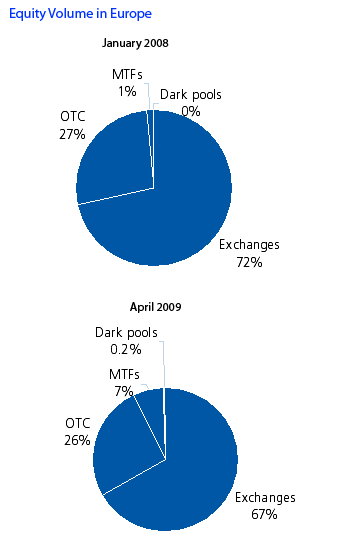Two Years After MiFID: No Turning Back for the Equities Markets
Abstract
Changes since MiFID took effect have been drastic, with exchanges competing in an uncertain economic environment. Between January 2008 and April 2009, the percentage share in the European equity market of the exchanges has gone down from 72% to 67%, while that of multilateral trading facilities (MTFs) has risen from 1% to 7%.
In a new report, Two Years After MiFID: No Turning Back for the Equities Markets, Celent looks at how the European equities market has evolved rapidly since the Markets in Financial Instruments Directive (MiFID) took effect in November 2007. The level of competition is much higher, as MTFs strive to create a faster and cheaper offering, and exchanges such as the London Stock Exchange and the OTC market fight to retain their market share. From the customer’s point of view, the MiFID environment offers much more choice in the form of cheaper and deterministic pricing as well as faster technology.
Most of the leading incumbent exchanges have lost considerable market share in their domestic markets. Exchanges such as Euronext and Xetra are especially under pressure. LSE has lost market share at home, but is holding its own across Europe, having consolidated its position in other national markets. While some MTFs have been successful, dark pools have been struggling, because they cater to a niche segment and also have not been helped by lack of transparency in regulation. Celent expects around half of the current number of MTFs, including dark pools, to remain operational by 2012.
"Change will not be easy-going for alternative trading systems. Only a limited number of MTFs will survive in the long run, as they search for profitability in an increasingly competitive market," says Axel Pierron, Celent, Senior Vice President and coauthor of the report.

It is expected that after the success in the equity markets, the purview of MiFID will be extended. "The extension of MiFID regulations to other asset classes, such as fixed assets and foreign exchange, is a distinct possibility to encourage more efficient dealing in these markets across Europe," says Anshuman Jaswal, Celent analyst and coauthor of the report.
The first section of this report analyzes the impact of MiFID on the main European equity markets and indices. The report then assesses the position of the leading MTFs already operating in Europe, such as
Chi-X, Turquoise, and BATS. Finally, Celent describes the role of dark pools in the European equity market. Regulatory practices affecting the functionality of these trading venues are also discussed.

